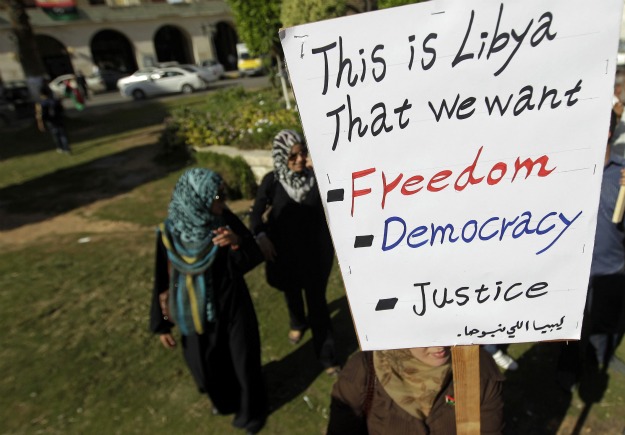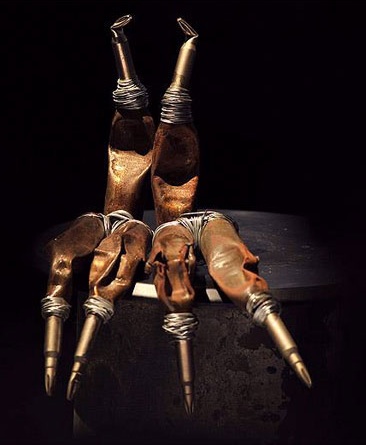By George Grant.

Tripoli, 19 November:
The National Congress has begun debate over the selection of the committee tasked with drafting Libya’s permanent . . .[restrict]Constitution.
Under the 2011 Constitutional Declaration, Congress was supposed to have selected the committee within 30 days of its first session, but delays in selecting the new Prime Minister and other crises have prevented the legislative body from devoting serious attention to the issue until now.
Central to Congress’s deliberations is the manner in which members of the committee should be chosen.
Article 30 of the 2011 Constitution states that the Congress shall be responsible for “selection of a statutory body from among non [NTC] members, which shall develop a draft constitution for the country”.
Lawyers have subsequently been debating what is meant by the word “selection”, generally agreed to be a vague term, but almost all are convinced it does not mean elections by the general public.
However, on 5 July, just two days before the 7 July Congressional elections, the outgoing National Transitional Council announced Constitutional Amendment No. 3 (2012) to the Constitutional Declaration. The amendment specified that the committee would be chosen by direct and free elections, as opposed to its being chosen by the Congress.
That decision sparked widespread criticism from both Congressional candidates and other sections of the public who felt the NTC was wrong to make such a momentous decision in the twilight of its term in office. Others objected on the principle that time-consuming and costly public elections were not the best way to choose a highly specialist body such as this.
At the time, the general mood was that Congress was likely to overturn this decision of the NTC, and that still appears to be the case at present.
“Most favour the Congress doing the choosing”, said Mokhtar Elatrash, an independent Congressman from Khoms. “If we’re going to do public elections it’s going to be ridiculous. You cannot choose an elite specialist body like this through general elections”.
Ahmed Langhi, an independent Congressman from Benghazi, concurred that a majority inside Congress favoured reversing the NTC’s decision: “These discussions have now begun, and most members support the view that Congress should choose the committee members rather than elections”.
However, the mood amongst many of Langhi’s constituents in Benghazi is rather less sanguine about the possible change. “The more we see the National Congress at work and how dysfunctional they are, the more I think elections are the best option”, said Hana Al-Gallal, head of the Benghazi National Council for Freedom and Human Rights in Libya.
A card-carrying federalist, Gallal insists that only popular elections will ensure that the best people are selected for the constitution-drafting committee.
“It’s so hard for the Congress to choose the right people. They are just acting according to their own preference, not the best interests of the country or the people. If they choose, it will be party-political and ideological.”
Responding to criticism that general elections may return unqualified candidates, Gallal says that appropriate selection criteria should be applied to would-be committee members hoping to stand for election.
“We are not at all saying that just anyone could stand”, she insists. “We need educated, qualified people, and not just qualified in constitutional law. We need to have experts in economics, religion, politics and human rights, and we also need to have young people and minorities, because all of these are issues and concerns in the constitution.
“It’s all very well having a professor of constitutional law, but he could be a person who doesn’t believe in women’s rights or minority rights, so those groups need to be represented.”
Gallal insists that the more people understand the arguments, the more they are choosing to support an elected committee as opposed to leaving it to the Congress. Others, however, point to a striking correlation between those who support elections and those who support federalism, arguing that this debate simply boils down to distrust of the central Government and a desire for greater regional control.
“The people who want elections are the federalists, and they are not as strong now as they were a year ago”, said Saleh Benali, an official with a UN agency in the city.
“There are many people who support elections, but 60 to 70 per cent of people in Benghazi are originally from the west, so the federalists do not have a majority. I myself am from the east, but I don’t like their ideas. I think right now they could divide the country.”
Benali also queried the assertion that elections could deliver a balanced spectrum of qualified candidates: “Yes, we need all the different people, from the law, human rights, women, young people, but elections will not bring all types of different people. Money, influence and the media will choose who will be there.
“Moreover, many educated people will not run for election; they don’t have money and they tend to shy away from the limelight.”
Now, Benali says that civil society activists in the east are seeking out the most qualified prospective candidates in order to present their choices to Congress for approval, something of a middle ground between elections and direct Congressional selection.
This approach also seems to be gaining strong support from inside the Congress itself.
“The choice [of committee members], will not just be made by the Congress, it will be made through consultation with the public, who will bring their choices to us”, says Elatrash.
“In fact, a committee has now been assigned to go to the east and persuade the federalists to step down their protests and to have one of their number on the constitution-drafting committee”.
Even if that approach is accepted, however, other issues remain to be determined. As currently conceived, the constitution-drafting committee will be 60-members strong, with 20 members from each of Libya’s three regions, Tripolitania, Cyrenaica and Fezzan.
What has yet to be confirmed, however, is whether Congress will decide as a whole on each of the 60 committee members, or whether Congressmen and women will only have a say in choosing members from their respective region.
During his term in office, NTC Chairman Mustafa Abdul Jalil suggested the latter course should be adopted, but not all in Congress are of the same mind.
“There is even a debate over whether there should be 20 members from each region, with some arguing this highlights divisions”, says Elatrash. “Some of my colleagues say we should just choose the best people in the country, but I’m fairly sure we will stick with the current system.
“However I do not know whether Congress members will choose by region or as a whole. This will be a lengthy process.”
Indeed, it appears that the only thing that everyone agrees on is that Congress is some time away from arriving at a consensus on how to proceed.
“We are still in the discussion stage, and it is too early to predict any outcomes”, said independent Congressman Salah Joudah. “We are discussing these issues and we will try to decide what is best for Libya”.
Ahmed Langhi agrees that final decisions are not yet imminent, saying the process will likely take “a few weeks”.
Once the committee is eventually selected, it will have 120 days to present a draft constitution, which must then be voted on by the people in a referendum within a further 30 days. For approval, the constitution must receive a two-thirds majority and must be referred to the Congress for issuance. [/restrict]









